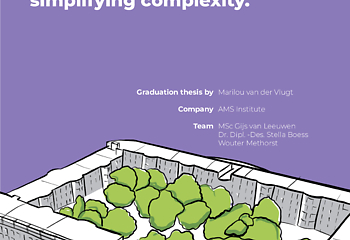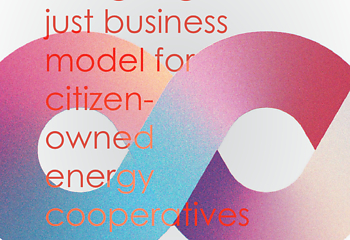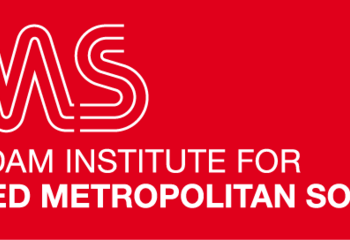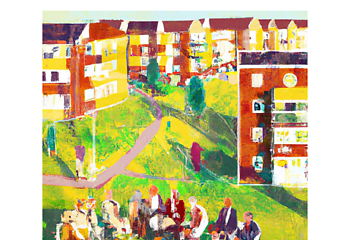Source: TU Delft
-
Collectie
MSc-thesisprojecten Energie Lab Zuidoost
Binnen het Energie Lab Zuidoost vindt er ook veel onderzoek plaats dat uitgevoerd wordt door studenten. In deze collectie treft u een reeks aan afstudeeronderzoeken.
-
Artikel
Engaging residents in sustainable renovation by simplifying complexity
The energy transition is crucial across various sectors, including housing. Constructing energy-efficient buildings and renovating older structures are key steps to reduce emissions. Renovation focuses on improving thermal quality and integrating green energy sources, addressing both climate and social goals, particularly to combat energy poverty. Participation is vital in this process, but it faces barriers. Marilou has identified six themes: position, trust in officials, knowledge, social cohesion, practical factors, and personal factors. To find a way to do engage residents, a Research through Design approach was used, exploring vision building workshops, public discussions, serious gaming, and interactive knowledge tools. The outcome is an interactive and visually engaging design to reduce the identified barriers, empowering residents to shape sustainable renovation processes for their homes.
-
Artikel
Designing a just business model for citizen-owned energy cooperatives
A way for residents to actively participate within the energy transition is through energy cooperatives. However, understanding the needs of vulnerable groups and their participation within energy cooperatives is still a challenging task. Hence, the central research question emerges: “How might we build a just business model for energy cooperatives?” To address this question, three critical theories were combined: energy justice, business model innovation and cooperative design. Following the field research and design phase, “a handbook of energy justice for energy cooperatives” is created. This handbook serves as an entry point for energy cooperatives to comprehend energy justice and its implications for their business models.
Source: TU Delft
-
Artikel
The Global Warming Impact of Applying Bio-Based Insulation Materials in Residential High-Rises in Amsterdam
In light of the changing climate and the need for urban densification in the Netherlands, this study analyzes the potential global warming impact (GWI) of implementing bio-based insulation materials (BBIMs) in high-rises in Ams- terdam. A literature and market review led to the identification of straw, grass, hemp, flax, wood-fiber, and cellulose insulation as the most relevant BBIMs in the Dutch context because of local availability and potential scalability. From an expert interview on fire-safety constraints of BBIMs, it was concluded that a 12 mm layer of gypsum fiberboard is needed to ensure fire safety in high-rise buildings for insulation materials which do not meet fire-safety class A1/A2. The GWI of the BBIMs was compared with stone wool, glass wool, expanded polystyrene (EPS) and extruded polystyrene (XPS) through a dynamic Life Cycle Assessment (LCA). The results consistently demonstrated optimal GWI performance for the plant-based BBIMs, while XPS and cellulose typi- cally had the highest GWI. In a building case study, cumulative radiative forc- ing values between 1.61e−8 W m−2 yr (cellulose) and −1.66e−8 W m−2 yr (straw) were found in 2222. For the insulation of all 97.500 residential high- rise buildings which are to be built in Amsterdam until 2050, these values were 2.50e−6 W m−2 yr (XPS) and −2.59e−6 W m−2 yr (straw). Annual emissions savings of up to 587 tons of CO2-equivalents were projected when switching from XPS to straw insulation. In working towards its 2050 climate neutrality goals, the city of Amsterdam is advised to stimulate the implementa- tion of BBIMs in all buildings, focusing on straw, grass and hemp in prefabri- cated façades.
Source: TUD & WUR
-
Artikel
The potential of collective governance for a just energy transition
The Netherlands aims for climate neutrality by 2050, targeting a 55% CO2 reduction by 2030. Municipalities lead the energy transition, focusing on renovating buildings and achieving targets on housing. Amsterdam prioritizes citizen engagement, aiming for 7,500 new homes yearly and climate neutrality by 2050. Collaborative governance is crucial, especially in underprivileged areas like Amsterdam Zuidoost. Challenges include capacity constraints and differing views on energy justice among stakeholders.
The research question at hand is, "How can a just energy transition be ensured with a local collective energy system in an underprivileged neighbourhood undergoing new development by employing collaborative governance?" A mixed-methods research approach provides insights and recommends a collaborative model involving government, the market, civil society, and citizens, with independent mediating entities bridging community experiences and energy transition complexities.
Outcomes are that government policies supporting public and local ownership are crucial, along with financial support and institutional arrangements to ensure a just and sustainable urban energy transition.
Source: TU Delft & WUR




